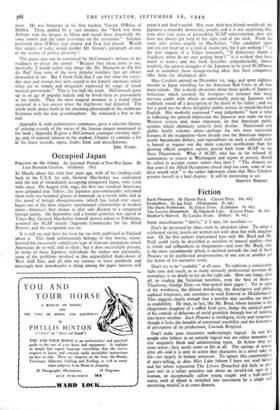Occupied Japan
Popcorn on the Ginza. An Informal Portrait of Post-War Japan. By Lucy Herndon Crockett. (Gollancz. 15s.)
IN Manila about this time four years ago, with all his landing-craft back in the U.S.A. for refit, General MacArthur was confronted with the task of immediately occupying conquered Japan, some 1,50o miles away. On August 27th, 1945, the first two hundred Americans were airlanded near Tokyo ; the Japanese area-commander welcomed them with two hundred glasses of lemonade on a trestle table, and in this mood of benign obsequiousness (which has lasted ever since) began one of the most singular international relationships of modern times—America's first chance to play solo dictator to a conquered foreign nation. On September 2nd a formal armistice was signed in Tokyo Bay, General MacArthur himself moved ashore to Yokohama, assumed the SCAP mantle (Supreme Commander for the Allied Powers) and the occupation was on.
It is still on, and there has been far too little published in England about it. This book unfortunately belongs to that breezy, warm- hearted but excessively complacent type of itinerant journalism which Americans do so well, and so often ; but it does successfully present, in terms of those Japanese individuals the author met personally, some of the problems involved in this unparalleled shake-down of West with East, and all who are curious to learn painlessly and amusingly how demokrashii is doing among the paper lanterns will
enjoy it and find it useful. Not even their best friends would call the Japanese a naturally democratic people, and it is not surprising that, even after four years of painstaking SCAP indoctrination, they still have not always got hold of the right end of the stick. From the voter who writes-angrily to MacArthur, "Our candidate spent 200 yen per head•up to a total of 20,000 yen, but I got nothing ! " to the pert enquiry of a Tokyo housewife, " If democracy means a frigidaire, when do we start getting them ? " it is evident they have much to learn ; and this book describes sympathetically, almost tenderly, thc earnest struggles of the Japanese to be good SCAPanese and to assimilate those strange-tasting ideas that their conquerors offer them for ideological diet.
Miss Crockett arrived on December 1st, 1945, and spent eighteen months in Japan travelling for the American Red Cross in all four main islands. She is nicely observant about those quirks of Japanese behaviour which astonish the foreigner—for instance that loud, nervous cackle with which an emotionally pent-up Japanese will suddenly round off a description of the death of his father ; and she has a good eye for those delightful public notices in round-the-bend English. Her modestly expressed " snap judgements " have a value as reflecting the general impression the Japanese now make on their Western visitors and, more important, on that. American public opinion which ultimately controls their destiny. Nutritional and public health schemes alone—perhaps the two most successful
features of the occupation—have already cost the American taxpayer nearly 800,000,000 dollars, and expenditure on such a colossal scale
is bound to require one day more concrete justification than the glowing official progress reports passed back from SCAP to the State Department. What if SCAP, who has so far refused all summonses to return to Washington and report in person, should be called to account sooner rather than later ? "The chances are that even if the Allied Occupation closed shop too soon, some of our ideas would stick " is the rather lukewarm claim that Miss Crockett permits herself in a final chapter. It will be interesting to see.
MERVYN HORDER.


































 Previous page
Previous page